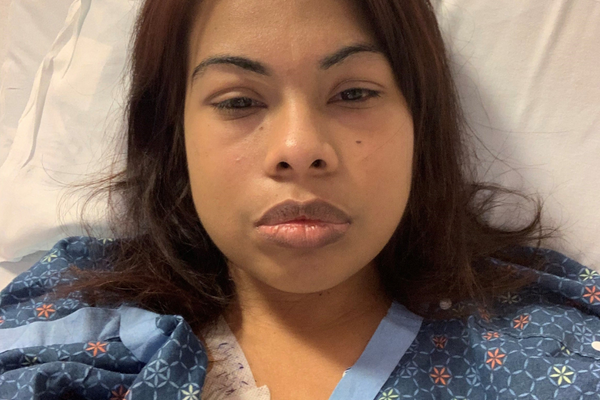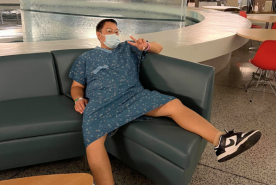October 24, 2023
Antes de 2018, Jessica Figueroa mantenía una relación tóxica y trabajaba muchas horas para cuidar a su familia. En última instancia, el estrés y la intensa carga de trabajo la hicieron enfermar increíblemente. Si bien la enfermedad fue dura, le dio a Jessica la fuerza para hacer cambios grandes para su salud y felicidad. Terminó la relación, encontró un trabajo que apoyaba el equilibrio entre el trabajo y la vida personal, y comenzó a comer de manera más saludable.
Durante un tiempo, la salud de Jessica se recuperó. Ella se sentía mejor de lo que había estado en mucho tiempo. Sin embargo, al final del año, volvió a enfermar y nadie pudo averiguar por qué.
Diagnóstico de lupus de Jessica
Se necesitaron seis meses de pruebas y frecuentes visitas al hospital para que Jessica recibiera un diagnóstico de lupus y nefritis lúpica.
“Con el lupus, las personas tienden a tener malos diagnósticos. Es una enfermedad que puede camuflarse. La única razón por la que me trataron es que notaron que los esteroides hicieron que los problemas desaparecieran”, dijo Jessica. “Poco a poco, mis médicos decidieron hacer otras pruebas para enfermedades autoinmunes y finalmente me diagnosticaron lupus”.
A pesar del tratamiento, Jessica ingresó en una enfermedad renal terminal y necesitó diálisis de emergencia en mayo de 2019. Pasó dos meses en el hospital tratando de recuperarse de la acidosis metabólica y la hipertensión arterial.
“Me di cuenta de que estaba empeorando. No podía hacer cosas simples como cocinar o abrir tarros, y ni siquiera podía maniobrar mi vehículo o conducir”, dijo Jessica. “Mi lupus tomó el control. Se volvió muy agresivo y atacó los riñones porque no lo tratamos con la rapidez suficiente. Por suerte, mi familia y mi marido siempre estuvieron ahí ayudándome para que pudiera mejorar. Le di todo a mi salud. Me aseguré de comer bien, de tomar la medicación correctamente y de seguir mis restricciones de agua”.
La determinación de Jessica dio sus frutos; sus riñones regresaron a la etapa 3 y pudo interrumpir la diálisis. El lupus entró en remisión.
¿Buscas más información?
Únete a nuestra comunidad
Mantente conectado y accede a recursos adicionales relacionados con la enfermedad renal.
Luego vino la COVID-19
Jessica siguió trabajando arduamente para controlar su salud siguiendo una dieta baja en acidez, haciendo ejercicio y tomando los medicamentos según las indicaciones de los médicos. Estaba haciéndolo increíblemente bien hasta que contrajo la COVID-19 a finales de 2020, lo que provocó un deterioro de su función renal.
Durante el año y medio siguiente, Jessica y su equipo de atención médica lograron mantener a raya la insuficiencia renal, pero las cosas se volvieron peores en marzo de 2022. Ahora se encuentra en la etapa 4, y su función renal empeora rápidamente.
“Necesitaba una cirugía para poner una fístula en el brazo izquierdo para estar preparada para una diálisis futura”, dijo Jessica. “Ha sido una montaña rusa y ahora estoy recibiendo quimioterapia como último tratamiento porque nada más está funcionando. Me estoy preparando para un trasplante en el futuro”.
Luchar con fuerza, difundir conciencia y amar la vida

Ahora Jessica está en una relación saludable y concentra su energía en sus hijos, su estilo de vida y la ayuda a personas con enfermedades invisibles como ella.
“Al igual que la enfermedad renal, el lupus no es una enfermedad que las personas puedan ver. Es invisible: parece que no hay nada malo en ti. La gente ni siquiera ve ningún tipo de problema conmigo hasta que estoy en un hospital”, dijo Jessica. “Para una persona normal, alguien puede lucir bien, pero internamente no está bien. Así que estoy escribiendo un libro para ayudar a la gente a entender cómo es esta enfermedad”.
Además de trabajar en su libro, Jessica está usando su positividad para difundir conciencia y dar esperanza a otras personas que viven con lupus y nefritis lúpica.
“Definitivamente soy una persona que es extremadamente positiva. Voy a seguir luchando. Mi esperanza es generar mucha más conciencia, recaudar fondos y promover la prevención temprana y más recursos para ayudar a las personas a aprender sobre estas enfermedades”, dijo Jessica. “El lupus y la enfermedad renal son solo parte de mi viaje y me di cuenta de que, si esto nunca hubiera ocurrido, nunca habría conocido a tanta gente genial en el camino”.

















